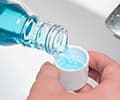Dry Mouth and Your Oral Health
Dry mouth, also called xerostomia, can come from several conditions—medication side effects, autoimmune disease, chemotherapy, radiation, and more, as stated by the American Dental Association (ADA). Signs and symptoms can look like:
- A sticky, dry feeling in the mouth or dry feeling in the tongue
- Trouble chewing, swallowing, tasting, or speaking
- A burning sensation in the mouth
- Cracked lips
- A dry, rough tongue
- Mouth sores
- An infection in the mouth
What’s more, dry mouth can have an impact on your dental health and lead to tooth decay, inflammation, and oral infections. That’s because natural saliva works to cleanse your oral cavity, helps you to chew and swallow food, maintains a neutral pH in your mouth, and prevents demineralization of your teeth.
Why Use Artificial Saliva?
When it comes to treating and managing symptoms of dry mouth, you have options. According to The Cleveland Clinic, there are three main courses of action: managing the medical conditions and medication(s) causing dry mouth, preventing tooth decay, and increasing saliva production.
When it comes to increased saliva production, your oral care provider might recommend an artificial saliva spray or rinse, which you can purchase over the counter. In some cases, they may also prescribe a drug that promotes the increase of natural saliva. While artificial saliva products can help, they do not contain digestive and antibacterial enzymes or other biological saliva proteins and minerals.
Aside from artificial saliva, the ADA mentions other remedies you can try to relieve dry mouth:
- Drinking water or sugarless, caffeine-free drinks
- Chewing sugar-free gum or sucking on sugar-free candy
- Using a humidifier at night
- Avoiding dry, hard-to-chew foods as well as salty or spicy foods
- Avoiding sticky and sugary foods
- Avoiding alcohol (including mouth rinses that contain alcohol) as well as tobacco
- Using lip lubricants
You may need to try a few different treatments to find the one that works best for you. Use artificial saliva as often as needed or per your doctor’s direction, but make sure not to eat or drink for at least 15 minutes after use.
Saliva Substitute vs. Saliva Stimulant
A saliva substitute, or saliva replacement product, replaces natural saliva. Further, according to the FDA, artificial salivas are regulated by FDA as medical devices, and their purpose is to moisten and lubricate the mouth. They do not stimulate the salivary glands to produce saliva.
In contrast, a saliva stimulant increases the natural production of saliva. According to the ADA, the most efficient way to stimulate salivary flow is chewing. It causes muscles to compress the salivary glands and release saliva; that's why chewing your food well is so important. Chewing gum may help increase saliva production, but note that the ADA recommends sugarless brands.
Oral Hygiene for Dry Mouth
When you have a dry mouth, good oral hygiene is even more important to help remove bacteria and plaque biofilm that can cause tooth decay and gum disease. Brush twice a day with a soft-bristle toothbrush and fluoride toothpaste, floss daily, and use peroxide-free and alcohol-free dry mouth mouthwashes to avoid drying out your mouth.
If you suffer from dry mouth, be sure to reach out to your oral care provider to discuss your symptoms, and develop a treatment plan that works best. You don’t have to live day-to-day with the annoyance of dry mouth. Several treatment options, including artificial saliva, that can get your mouth feeling healthy and back to normal.
This article is intended to promote understanding of and knowledge about general oral health topics. It is not intended to be a substitute for professional advice, diagnosis or treatment. Always seek the advice of your dentist or other qualified healthcare provider with any questions you may have regarding a medical condition or treatment.
ORAL HEALTH QUIZ
What's behind your smile?
Take our Oral Health assessment to get the most from your oral care routine
ORAL HEALTH QUIZ
What's behind your smile?
Take our Oral Health assessment to get the most from your oral care routine
Join Us
Get the best of your oral health routine and take it to the next level with expert advice, recommendations, products and solutions and special offers.
Join Us
Get the best of your oral health routine and take it to the next level with expert advice, recommendations, products and solutions and special offers.















